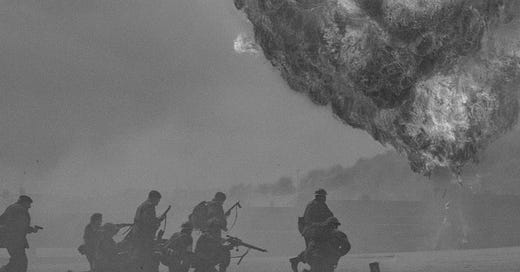Hello reader,
First, we got Russia-Ukraine and now have Israel-Hamas. Many thinkers said that we have “advanced” enough to make the prospect of war untenable, and yet we find ourselves embroiled in one major conflict after another.
This makes me wonder- what are the causes of war? What factors work together to produce (and prevent) them? Are wars inevitable?
Here’s a short analysis of the nature of warfare in ten brief points:
Asking who won a war is like asking who won the earthquake- one can only measure the degree of defeat. A key question we want to answer is if war, just like an earthquake, is a natural occurrence that our wit is unable to control or solve.
There are 3 actors that interact in determining the question of war: individual people (leaders of a state), the internal structure of states (the political system of nations), and the international system in which different countries/states interact.
Some thinkers feel that the way to solve the problem of warfare is to fix the individuals (leaders, politicians, etc.) with psychology and psychiatry. Bertrand Russell suggested that war was a consequence of our possessive qualities, while Aristophanes said that if men were denied the pleasures of the couch by their wives they’d turn to the exhilaration of the battlefield. “If only these people’s nature can be improved, war can be avoided” is the line of thinking. But this raises some questions. One, what exactly are they supposed to be taught and how will one ensure that they follow what they’re taught? Two, if most politicians become enlightened, the problem will still exist if even a handful of them aren’t- for such a system to work, everyone has to think in the same, enlightened way.
The idea that “the evil element in our nature is the root cause of war” attempts to explain all our problems with individual psychology, and suggests that if we fix men, we can fix everything. This is as true as it is irrelevant, for this generalized idea applies to all flaws in human nature. The attempt to explain everything with psychology ends up explaining nothing.
Some even believe that war is a social invention and not a biological necessity, and we can easily do away with it by finding better ones to serve the same purpose it does. Just as we moved beyond dueling and public torture, we might be able to move past war by finding a better outlet for young men’s aggressive impulses and their need to fight for honor.
A second theory proposes that war is actually caused by the internal structure of states. States often go to war either to: a) Solve internal problems like tackling sedition/preventing civil war, b) Increase their popularity among the masses- there’s nothing like finding an enemy to unite everyone in a country, which is why Lincoln’s advisors urged him to wage war on Spain and France, or c) Increase their powers over their own people by expanding bureaucracy and raising taxes. Thus, the idea is to fix the state in order to end the endless wars. Some, like Immanuel Kant, believed in nonintervention- allowing the evolutionary forces to play out so the state would improve over time. Others, like Mazzini, didn’t want to sit around waiting for history to do the job and wanted to make interventions and adopt a policy of realism.
This realism, however, can turn out to be very dangerous. States that fight in the name of selfless idealism can wage much longer and bloodier wars instead of those who war for narrow self-interest, because both can say they’re fighting for just causes but who can decide what’s “just” in such cases? AJP Taylor had a great quote on this: “Bismarck fought necessary wars and killed thousands, the idealists of the 20th century fight just wars and kill millions”.
A third theory asserts that it is the international system of anarchy, without any single body to govern all nations, that leads to wars. Many, therefore, resort to the idea of a world government to solve this problem once and for all. But we can see how the suggestion is not only practically infeasible but also risks a slide into totalitarianism if it is ever attempted.
Rousseau suggests that social situations make conflict inevitable and provides an example to illustrate the point. When 5 hungry men in a jungle decide to coordinate to trap a stag and relieve their hunger, one of them spots a rabbit and diverts his energies to kill it so he can feed himself, leaving the rest of them in the lurch. Spinoza says this happens because we’re imperfect and can’t use reason properly but for Rousseau, it’s our social circumstances- if the rabbit catcher has to forego the opportunity, he must trust that the other men would also be perfectly rational and do the same which is a problem. This leads men to default all the time. Conflict will occur out of competition and man’s attempts at cooperation.
In conclusion, in an international system of anarchy where all states act in autonomous ways to pursue their own national interests and use force wherever needed in the absence of an arbitrator, it is hard to create harmony. The nature of this reality, combined with the quirks of human nature and the political systems it leads to, makes war a constant possibility.
These ideas are based on my reading of the book ‘Man, the State, and War’, a classic in the field of international relations. If you enjoyed it, you may also like to read:




